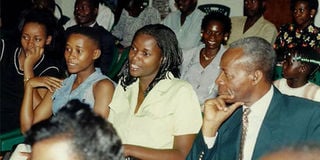Elly Wamala's mark on the recording industry

Elly Wamala with his daughters Lydia, Patricia and Trudy
What you need to know:
Talk about Elly Wamala and anyone who saw him in action will say words of reverence, especially about his music. We look at the areas in which he is remembered
Earlier this year, the estate of the late Elly Wamala teamed up with several leading lights of the local music industry for a project to celebrate the deceased legend’s contribution to Ugandan music.
Several of Wamala’s songs were redone by selected artistes (including musicians Jose Chameleone, Bobi Wine, Radio and Weasel, Bebe Cool and Iryn Namubiru) so as to revive the late maestro’s art for contemporary fans. And now next weekend the artistes who did renditions of the late musician’s songs are scheduled to relive them on stage at Kampala Serena Hotel.
The Wamala memorial project is against the widely-shared opinion that Wamala was not only one of the founding fathers of Uganda’s recording music industry, but also a man, who in several ways, provided the local industry with direction over the more than four decades he was involved with music. NEXT herein looks at how exactly the musician walked in those big shoes associated with his name.
Pioneer in local recording
According to different people who have followed the history of Uganda’s recording music industry, Elly Wamala was among the first Ugandan musicians to have their music in recorded format. Way back in 1959, Wamala recorded his songs Nabutono and Josephine on the vinyl recording technology of the time.
Hope Mukasa, who was to become lead singer of Wamala’s Mascots Band, says he grew up listening to Wamala’s music on radio and watching it on TV, and that in an era when there were few recorded Ugandan musicians, Wamala thereby played a role in inspiring other musicially-talented Ugandans into the profession.
Even more significant than having his music on radio and TV, however, Wamala is largely lauded for having pioneered the genre of Kadongo kamu, that style where vocals are done to the beats of a single guitar strung in mimicry of the Ganda Bakusimba drumbeats.
There is a long story of how Wamala concocted that genre, and seasoned music critic Joseph Batte is on record reckoning that this genre did so much to advance the local recording industry that was then fledgling, as it inspired Ugandan musicians to use new recording technology to produce locally-inspired music.
In the interviews he did while still alive, Elly Wamala is on record saying he was one of the Ugandan musicians who first held solo concerts in the country. Wamala recounted how he got inspiration to hold his own concerts after Kabaka Mutesa II made it a weekend routine to summon him for private performances at his palace in Bamunanika. That this emboldened him to venture into holding his own shows at theatres and town halls, instead of simply performing as a piece of dessert in nightclubs and bars.
And city lawyer Andrew Kasirye, who had just completed high school in the 1970s and played with Wamala’s Mascots Band, adds that Elly Wamala in fact wasn’t just one of the first Ugandan musicians to hold concerts, but also one who promoted the culture of concerts very passionately.
“Wamala always advocated for musicians to hold their own concerts where they are the main event,” Kasirye says. “He didn’t want them to just perform as side acts in bars and nightclubs. I think because he was a well-travelled and exposed man, he wanted Ugandan artistes to emulate the Western artistes he had seen –the likes of Tom Jones and Abba who held sold-out concerts.”
Kasirye reminisces that before Jimmy Katumba took Uganda’s concert experience above the roof in the 1980s –when as Billy Katumba and the Ebonies he held gargantuan concerts at places such as the Lugogo Cricket Oval –the musician actually befriended, understudied and consulted Wamala on concerts.
Mentoring contemporary artistes
The Mascots Band lasted less than three years owing to the political turbulence of the times and was no more by the time Idi Amin was overthrown in 1979, but Mukasa says Wamala continued supporting artistes in their careers throughout his life.
In 1989, Wamala teamed up with several other musicians to form Musicians’ Club, a club of Kampala’s elite musicians that met at the National Theatre (Jam Session) every Monday to discuss their own personal issues as well as to entertain primarily for themselves.
Contemporary musician Bobi Wine remembers Wamala as a person who always advised the younger musicians on how to live responsibly –to diversify their sources of income so they wouldn’t have to rely on music alone, to live responsibly and carry themselves with respect, to look after their families, among other things.
Advocated for quality
Hope Mukasa recalls that Wamala always encouraged musicians to do their best to produce good music, and through perfection in his own work inspired many to emulate him. “His grooming made us very good and inspired us to always aim at producing quality music,” Mukasa says. “He always encouraged us to master the instruments and to put in our all in composition and performance.”
Elly’s daughter Gertrude Wamala says: “His approach to music wasn’t just about producing and sending out work, rather he first and foremost minded the quality of what he was sending out. He endeavoured to encourage other people to consider quality. In fact, he didn’t so much as appreciate one who could sing, but the one who took time to create.”
Supporting fellow musicians

Elly Wamala performing Boda Boda. On the motorbike is Jose Chameleone.
Andrew Kasirye says throughout his career, one significant way in which Elly Wamala directly influenced the direction of Ugandan music was his support for the development of his fellow musicians’ careers. “Because he was a different breed from the musicians of his time, a trained musician who was also a career man with a daytime office job, many musicians of all career levels looked up to him and regularly consulted him on different issues,” Kasirye says. “And he was always supportive of every one. He wasn’t afraid of fellow big names that he could have seen as rivals, for example he always invited the likes of Fred Masagazi, Philly Lutaaya and Moses Matovu to his concerts.”
On his part Hope Mukasa recalls how Wamala enabled him and a score of other talented young musicians of the late 1970s to start out in their music careers.
“He was already a popular musician who also presented on TV, “Mukasa recounts, “And then news went around that he had brought in standard equipment from abroad to start a band, and he was auditioning talented young men at his residence in Nakasero.
So many of us went and auditioned and we got a chance to start out under his tutelage. The likes of Andrew Kasirye, Kabuye Ssemboga, Steven Ntambi, Frank Mbalire, Allan Shonubi… all found in those auditions the chance of a lifetime to start out as professional musicians…”
Dunstan Mukalazi, who worked with Wamala for more than 10 years cutting across the 1990s, remembers Wamala as a man who supported musicians’ careers by paying “fairly, handsomely and always on time,” which is necessary if any musician is to keep and grow in the trade. Mukalazi says: “You worked, you got your money, there and then.”
Quick hits
Bio. Born: December 13, 1935. Died: 2004, aged 69 years. Survived by wife Esther Wamala and 13 children
Popular Songs. Viola, Ebinyumu Ebyaffe, Talanta, Bodaboda, Nga Bwewakolanga
Concert. Elly Wamala All-Star Tribute Concert on Friday December 12 at the Kampala Serena Hotel. Single tickets are Shs100,000 and Shs1m for a table




